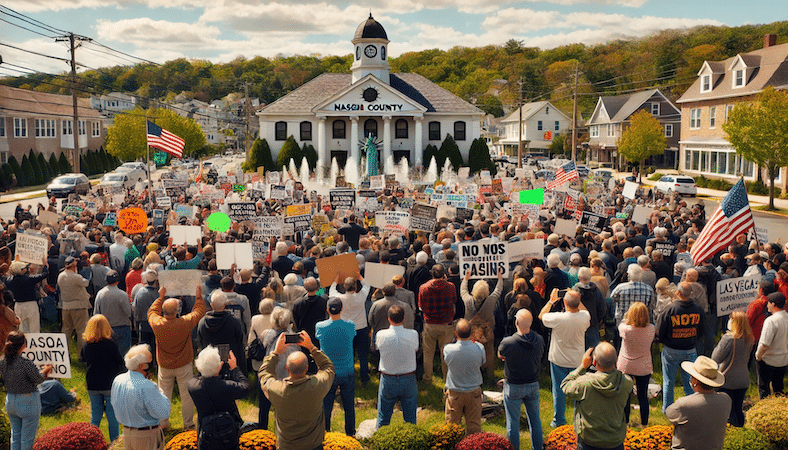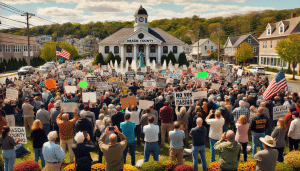On a Thursday in Nassau County, residents and community leaders came together to protest against the proposal to build the second-largest casino in the United States within their community. This demonstration occurred shortly after the Nassau Planning Commission unanimously approved transferring control of the Nassau Coliseum to Las Vegas Sands. This step was crucial in the company’s quest to obtain one of New York’s limited casino licenses.
Limited Local Support for the Project
Thursday’s approval by the Nassau County Planning Commission involved a 42-year lease agreement, granting Las Vegas Sands control of the Nassau Coliseum. This decision followed significant setbacks, including the New York State Supreme Court’s annulment of a previous lease agreement, citing violations of the state’s open meeting laws. Despite these developments, the community remains deeply divided. Opponents argue that the proposed 400,000-square-foot casino—equivalent to seven football fields—would draw around 23,000 daily visitors, potentially overwhelming local infrastructure and altering the community’s character. Las Vegas Sands responded to the opposition by acknowledging that not all locals were against the project, stating that there was more support than opposition.
What kind of environment are we creating for our future generations if we allow a casino corporation to manipulate 72 acres of prime Nassau County real estate into something that resembles a mini Atlantic City?
A recent report by ABC7 New York highlighted that several influential local organizations, including Nassau Community College, Long Island University, and Hempstead Chambers of Commerce, supported the casino project. They emphasized that the casino would generate thousands of jobs and enhance economic opportunities in the region. Nonetheless, public opinion is sharply divided, with strong opposition rallying against the casino proposal.
Persistent Public Opposition
The Say No to the Casino Civic Association has been a vocal critic of the project since its inception. According to a recent Newsday/Siena College poll, a majority of Nassau residents are opposed to the casino, with 49% against and 42% in favor of the proposed venue. Some residents have drawn unfavorable comparisons to Atlantic City, expressing concerns about the project’s viability and long-term impact. The association issued a statement expressing disappointment with the vote, noting that Las Vegas Sands could potentially close the Coliseum after just two years. They also alleged that the casino project was advancing without the required environmental review, raising concerns about the operator’s plans for the land.
The Say No to the Casino Civic Association stated:
Our County leadership is abdicating their role as stewards of this taxpayer-owned land, in exchange for… a future for Nassau County wracked with high crime, environmental strains, and an inevitable increase in gambling addictions.
The Path Ahead
As the lease agreement moves to the rules committee for a vote on Monday, the debate over the casino project continues to polarize Nassau County. The future of the project remains uncertain, reflecting broader concerns about the social and economic impacts of such a development in a suburban community. The ongoing controversy underscores the deep divisions within the community, with many residents worried about the potential negative consequences on their way of life.
Gambling Regulations in New York State and Nassau County
New York State has a complex regulatory framework for gambling, designed to balance economic benefits with social responsibilities. The New York State Gaming Commission oversees all gambling activities within the state, including casinos, horse racing, lotteries, and charitable gaming. In recent years, New York has expanded its gambling options, with the approval of commercial casinos in 2013 and the subsequent opening of several upstate venues. These regulations aim to ensure fair play, prevent gambling addiction, and generate significant tax revenue for state and local governments. Nassau County, as part of New York State, adheres to these regulations but also has local ordinances that address specific community concerns, such as zoning laws and public safety measures related to gambling establishments.
Gambling Regulations in Other U.S. States
Across the United States, gambling regulations vary widely from state to state, reflecting diverse attitudes and approaches to gambling. States like Nevada and New Jersey are well-known for their permissive gambling laws, with robust casino industries that are major economic drivers. Nevada, home to Las Vegas, has a long history of legalized gambling and minimal restrictions, allowing a wide range of casino games and sports betting. Conversely, states like Utah and Hawaii prohibit most forms of gambling, reflecting strong local opposition. Many states fall somewhere in between, with regulated lotteries, limited casino gaming, and specific provisions for tribal casinos. The regulatory environment continues to evolve, particularly with the rise of online gambling and sports betting, which have prompted many states to reconsider and update their laws to accommodate new technologies and consumer preferences.
The Challenge with Casinos and Communities
Casino projects often bring a mix of economic benefits and social challenges to their host communities. Proponents argue that casinos can revitalize local economies by creating jobs, attracting tourists, and generating significant tax revenue. For instance, in regions where casinos have been established, local governments often receive a portion of the gambling revenue, which can be used to fund public services and infrastructure projects. However, these economic benefits are often accompanied by social costs, such as increased crime rates, gambling addiction, and other social issues.
In the case of Nassau County, the proposed casino has sparked a heated debate about the balance between economic development and community well-being. While some residents and local organizations see the casino as an opportunity for economic growth, others fear it will bring more harm than good. The concerns about increased crime and environmental strains are particularly salient in suburban communities, where residents may not be accustomed to the influx of visitors and the associated challenges.
Moreover, the issue of gambling addiction is a significant concern. Studies have shown that proximity to casinos can increase the prevalence of problem gambling in the surrounding areas. This can lead to a range of negative outcomes, including financial difficulties, relationship problems, and mental health issues. Addressing these concerns requires careful planning and the implementation of robust support systems for individuals who may be affected.
As Nassau County navigates this complex issue, it will be essential for local leaders to engage with the community and consider the diverse perspectives and concerns of residents. Transparent decision-making processes and thorough environmental and social impact assessments will be crucial in determining the best path forward for the community.


